"School life must be a quest for knowledge that goes far beyond the limitations of conventional curricula, text books and standardised examinations, so that when our pupils leave the school they are secure in their abilities, strong in their principles and confident to face challenges”
One of the leading ISC schools of the country, The Cathedral and John Connon School, located in the elite Fort area of Mumbai, is making strides using technology to enhance education, while it shines through for the hallmarks of discipline, respect for teachers, and high moral and ethical values that it stands by. Corporate Citizen catches up with Meera Isaacs, Dean, who has served in the school the past 40- odd years, to understand what makes this school so special
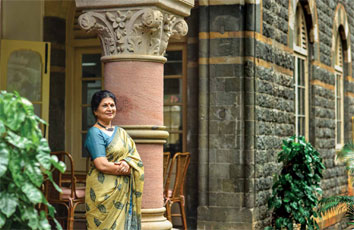
Meera Isaacs, Dean of The Cathedral and John Connon School in Mumbai has served here for 40-odd years. She began as a teacher, subsequently became its Principal and now serves as the Dean of this prestigious educational institution. She states that while academics is given high prominence here, ‘school life must be a quest for knowledge that goes far beyond the limitations of conventional curricula, text books and standardised examinations, so that when our pupils leave the school they are secure in their abilities, strong in their principles and confident to face challenges.’ Isaacs, a renowned educationist and recipient of the National Award for Teachers (2004) has won this year’s Women Achievers Award at IMPACT 2017, from the Ladies’ Wing of the IMC Chamber of Commerce and Industry in April 2017.
The school also gives high priority to values which is aptly summed up by Bernard Gunnery, Principal (1953-65), thus: “Indeed the School’s objective is all-round character formation and the development of proper attitudes. Consciously as well as unconsciously, pupils absorb a great deal apart from the subjects they study and in the great examination of life, it is this extra assimilation which speak of a school’s worth.”
Meera Isaacs: This is my 21st year. I have worked in Cathedral for a total of 40 years. In 1977 I came here as a teacher. I never ever thought that I would serve here for more than two or three years. That’s because my husband was in the Navy, but in 1980, my husband decided to put in his papers and join the merchant navy. The school was kind enough to give me a small flat, so while my husband Sudhir sailed the high seas, my two girls and I stayed back. I enjoyed my life here. To tell you the truth, I never wanted to become a teacher; I wanted to be a journalist, because my father was one. He tragically died in an air crash while on an assignment when I was five years old, so my mother vetoed journalism.
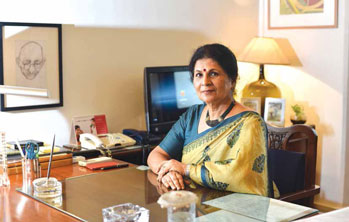
Frankly, I think the hallmark of the school is its excellent DNA. Our students strive to excel, not only in academics but extra-curricular activities as well. They are intelligent, motivated and highly competitive.
The old adage, ‘The world is your oyster’ is true of our youth. Creativity, innovation, the courage to be risk takers and to leap into the unknown characterise them.
We are fortunate to have good, dedicated teachers who for the most part, are excited about their vocation. They are willing to push the boundaries and techniques in teaching; and they are learning constantly.
Above all, an enlightened Board of Governors ensures that the School is always challenging itself.
The story of our school begins from St Thomas’ Cathedral. In 1860, Bishop Harding and the Cathedral Chaplain decided to open a Grammar School within the walled city of Bombay. This small establishment, together with an even smaller school for girls, were to be the first of many strands which were eventually joined together to form the Cathedral School as we know it. On October 1875, a Choir School was established with the primary objective of providing choristers for St Thomas’ Cathedral. In the meantime, in 1886, The Bombay Scottish Education Society put up a beautiful building on the Esplanade naming it after John Connon, a well-known philanthropist and Chief Registrar of Bombay (which is now our Junior School). Hence our full name of Cathedral and John Connon School.
We have been through different phases. We began here, went to Byculla, even hired tents on the maidan and then we finally settled in these buildings. The school is a Christian Anglican School that belongs to St Thomas’ Cathedral. Upto 1965, we had segregated schools for Boys and Girls. When in 1965 the Board decided to merge the Schools, some parents went to Court. Fortunately, Justice Lentin ruled in favour of the School’s decision. His courageous judgement has stood us in good stead all these years.
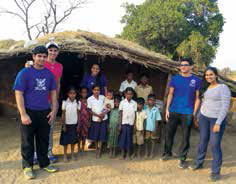
Our students are fairly advantaged. They are highly competitive and for many of them the ultimate goal is to be a well-respected professional. Many go abroad to study, and if that is one’s ultimate destination then you have to work hard.
Our students are children of government officers, civil servants, defence personnel, industrialists, IT professionals, bankers and businessmen. We are a heterogeneous, diverse, multi-cultural and multi religious potpourri.
Oh yes. Every section of the School has a Counsellor to help our children navigate the ever-changing world and the demands it makes on young minds and emotions. Remedial teachers of the Learning Resource Centre are available to help our children overcome tricky academic areas. And lastly, we have a Career Guidance Centre that is busy almost all the year round, advising students and parents on all the intricacies of both Indian and foreign university applications. It is thanks to the Guidance Counsellors and their deep knowledge of various educational systems that our students get admission to the best colleges of their choice.
Well, we try to make it relevant; we constantly talk about it. It is again a difficult proposition because the world has changed so much. I notice though that for the alumni, the school begins to regain its lustre when they pass out of the school and grow into young men and women. More than the school, it is the ‘House’ to which they had belonged, that means everything to the children. The first question a former Cathedralite asks another is, “Which House were you in?”
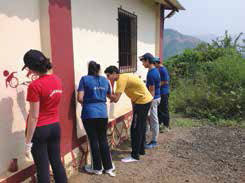 Std. XI students building built toilet blocks for an
Adivasi village in Jauhar Taluka, Thane District as a part of Community Service programmes
Std. XI students building built toilet blocks for an
Adivasi village in Jauhar Taluka, Thane District as a part of Community Service programmesThe changes in the environment and especially those brought about by social media and information technology have made youngsters more aware, curious and certainly more questioning, which is all as it should be.
Keen minds are more than welcome, but disrespect, arrogance and indiscipline are frowned upon. We have a strict dress code which some may find galling and an essential set of rules of discipline and conduct which are clearly formulated to avoid possible anarchy ! I often tell the children that good manners and courtesy can never go out of fashion.
Integrity, compassion, helpfulness are all values that help build character. We have a strong Community Service programme to keep our youngsters grounded in a country in which disparities of wealth are so extreme. For example our Std. XI students in February this year built twelve toilet blocks for an Adivasi village in Jauhar Taluka, Thane District.
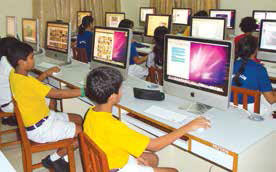 Computer Lab of Middle School
Computer Lab of Middle SchoolWestern studies, especially in England have advocated that the best education is imparted when boys and girls are segregated. I feel that in this day and age, with men and women working together, they need to learn how to deal with each other. If girls and boys are together, right from the time they are three years old, it becomes an easy transition to the workplace. Otherwise, the girls can be giggly and silly and the boys think they must exude machismo. I also think that working alongside girls helps to soften boys in some ways and to make them a gentler more civilised species. Girls too realise their true worth. The old-fashioned dictats of being seen rather than heard are no longer valid. Co-education is an excellent tool for fostering equality, transparency, freedom of thought and expression and mutual respect.
All of us need emotional strength. We try to teach our children that they are not always going to be successful. Failure is an intrinsic part of life, but the fact is that one has to pick oneself up and carry on. Resilience is of the essence. When children know that they can talk to someone who is non-judgemental, it makes life so much better for them. Timely counselling often can save the day. There are far too many pressures on youngsters these days. They have to be able to navigate through the myriad problems that life presents.
"Our students strive to excel...They are intelligent, motivated and highly competitive. The old adage, ‘The world is your oyster’ is true of our youth. Creativity, innovation, the courage to be risk takers and to leap into the unknown characterise them”
The advantages are manifold. Information Technology has transformed the world. That children are ‘digital natives’ is a given, so large vistas in every sphere are theirs for the taking, if it is done wisely and well. The economic upsurge has helped in myriad ways-one of the most obvious being the ability to travel to any corner of the world. Travel is a wonderful education which again unlocks new opportunities.
Today’s child is well-informed, articulate and unafraid of expressing his views. Practically no subject is taboo
Most definitely-many times the home and the School work together. When our own views are in sync we can do wonders. For example, the parents of a five-year-old child, who celebrated his birthday decided that they would not accept the customary gifts. Instead they chose an NGO that worked with underprivileged children. The host parents requested that if a gift was to be given, it should be a pair of shoes, which they would donate to the NGO. All the children who attended the party gave shoes as gifts. It has had such an exemplary impact that many children are doing this now. Little ones are like sponges. Their innate goodness is easily tapped. A sustained community service programme throughout the school has brought rich human dividends.
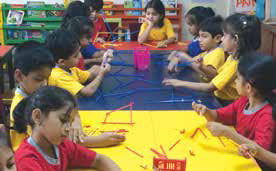
The question is more, “What do we not have?” On the sports front we have almost every sport barring hockey, horseriding and boxing. On the cultural front, you name it; we have it, drama, dance, music, elocution, debating, dramatics and a host of others.
One of our biggest events is the Cathedral Model United Nations (CMUN), the genesis of which was a trip to Harvard to attend the HMUN in 1996. It caught the imagination of our students and they started CMUN. It has grown to include roughly 500 delegates from school across India, Dubai and Bangladesh. For the past 7 years it has been held at the Trident Hotel’s Ballroom, the ambience of which is breathtaking-a fitting atmosphere for the Model United Nations in India.
The students of Stds. 11 and 12 organise it with the help of a few school teachers. In my opinion, Std. 11 and 12 are the best years as the students try their hand at a variety of ventures. They are encouraged to find their own solutions within the larger framework of the School. For example, apart from a number of competitions that various disciplines have begun, the latest offerings from our students are the TEDx Talks-a hugely successful and well run enterprise.
"The teacher’s role is more that of a facilitator and guide who mentors students to be thoughtful in their research, critical thought and ability to separate knowledge from mere information. The teacher also has to be multi-faceted−mentor, guide and counsellor”
By and large there is a good rapport with our parents. The PTA Executive Committee is extremely supportive. We have just completed a very successful series of talks on cyber crime and substance abuse under the aegis of the PTA.
There is however, no doubt that the traditional status accorded to the “guru” or teacher is fast dying. But as long as there is mutual respect all is well. What we need to remember is that both parents and teachers are working in the best interests of the child.
The teacher of today has to be technology savvy as that is the way forward, and has to keep abreast of the latest global educational developments.
The teacher’s role is more that of a facilitator and guide who mentors students to be thoughtful in their research, critical thought and ability to separate knowledge from mere information.
This is on the professional front. The teacher also has to be multi-faceted-mentor, guide, counsellor and sometimes a surrogate parent.
I definitely believe that every child has the right to education. There can be no gainsaying of this basic premise. My question is-if after 70 years of independence and crores of rupees being poured into the government school system, why is it still so woefully inadequate. The simple reason is that there is no accountability. Resources are siphoned off at every stage and the ultimate sufferers are the children.
Private schools for the most part, take pride in their work and have assiduously cultivated and maintained high standards. To expect them to bear the burden of years of public school mismanagement is eminently unjust. The broken system must be mended and restored. Just passing the burden onto private schools is the easy way out.
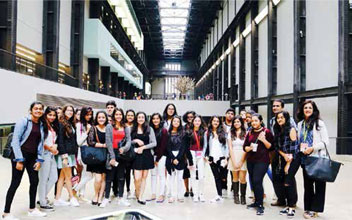
Parents and teachers are the best people to inculcate good work habits in their children. A structured environment for study at home is necessary. Most of our parents are highly educated, with many of them having studied in prestigious colleges and universities. Surely, they can supervise their children’s studies in a sensible way.
The unhealthy trend of bundling children off for tuitions or for interminable after-chool classes is most unfortunate. Children, at least till Std. 10 or 11 should not be pressurised with examinations. That is why we begin having formal examinations only in Std. VII.
As a school, we believe in transparency. A glance at the School Diary will prove my point. The School’s policies and expectations are clearly defined and enunciated. Any other communication is through the PTA, the School website etc. I welcome suggestions if it benefits our children. However, unnecessary and unproductive interference is certainly not encouraged.
There are a fair number of pressures on the modern family. Gender equality and economic pressures often dictate that both parents work. The fortunate few have older family members to help with the children. If not, they have to make do with nonfamily help. Job transfers and changes also contribute to the pressure. Through it all, parents try to do the best they can for their children.
I see the joint-family system in various avatars slowly returning in India.
Those children who have grandparents to pass on family traditions and values are indeed very fortunate.
"A structured environment for study at home is necessary. Most of our parents are highly educated, with many of them having studied in prestigious colleges and universities. Surely, they can supervise their children’s studies in a sensible way”
It’s a good idea, as long as practices and standards are in place. Transfers will then not be such a burden on children and parents. Everyone would be on a common platform. The only difference would be the delivery of the curriculum.
As long as we all strive for excellence, I see many advantages in a common syllabus across the country.
We have a standard set of norms, which we follow. Admission time is painful and sometimes annoying. As long as we follow our practice of admissions, which are merit-based we can breathe easy.
So many years of going through the process has toughened me considerably!
Really? (Laughs). Thank you! 40 years is a long time. There are some benefits that come with age!
I believe in the dignity of every human being. Treat everyone with respect, if one wishes to be respected in turn. Integrity of character and loyalty are important to me.
Shakespeare’s lines from Hamlet sum up my philosophy of life succinctly,
‘This above all: to thine own self be true And it must follow as the night the day Thou canst not then be false to any man’
Let me end with ‘the Cathedral Code of Ethics’ formulated by our Headboy of 2015, Arjun Mirani and his cohort of Prefects. It encapsulates beautifully what a Cathedralite should be.
I am a true Cathedralite
I play fair, I speak the truth, I give credit
Because I have Integrity.
I speak up, I stand up, I persevere
Because I have Courage.
I show courtesy, I am considerate, I am polite
Because I have Respect.
I reach out, I help out, I am kind
Because I have Empathy.
I participate, I am dependable, I am accountable Because I take Responsibility.
I volunteer, I serve, I spread joy Because I value Citizenship.
By Vinita Deshmukh